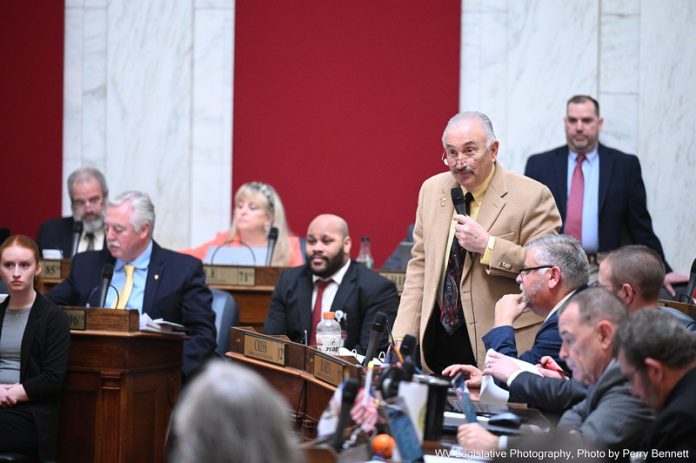This morning, the House Finance Committee met to take up House Bill 4025 – Budget Bill for Fiscal Year 2025.
The Governor’s Introduced Budget projected revenues for FY25 to be as follows:
- $5,222,841,436 in General Revenue
- $1,998,642,908 in State Road Fund
- $2,141,776,021 in Special Revenue
- $149,104,142 in Lottery Revenue
- $337,436,083 in Excess Lottery Funds
- $8,776,500,819 in Federal Fund
- $688,383,417 in Federal Block Grants
- $629,600,000 in General Revenue Surplus
- $16,750,000 in Lotter Net Profits Surplus
- $17,800,000 in Lottery Excess Surplus
- TOTAL projected revenue: $19,978,834,834,836
The House’s introduced budget makes the following changes to the introduced bill: $18,063,475 in improvements, $37,210,000 in general revenue reductions, and cuts the general revenue by $238,941,393.
The $18,063,475 of improvements in the House version of the budget are Judicial pay raise, Mountain State, Hope Scholarship Program, WV Consumer Privacy Act, mental health regions, Medicaid Cost Containment, intermediate care facilities, correction officer pay raise, Promise Scholarship, foster parent information system, and Ombudsman for the Department of Corrections and Rehabilitation.
The $238,941,393 of cuts are as follows: moving the Governor’s Congressional Earmark Maintenance of Effort and Direct Transfer and Medicaid to Surplus, reducing all departments to FY24 appropriations outside of Personal Services, Human Services, TRS Realized, and TRS Unfunded Liability.
When considering the anticipated gains and losses due to other House actions, the available to spend in the House Finance Amended Budget Bill is $5,185,631,436. When general revenue reduction is considered, the adjusted House FY25 Budget Bill is $5,001,936,518 with a surplus of $193,667,918.
The Governor’s total introduced general revenue surplus is $629,600,000 and the House’s amended general revenue surplus is $201,600,000. The difference is $428,000,000. The reason for this is a potential federal government clawback of $465 million of COVID and CARES money. The federal government sent out money and then provided rules for the spending after it had been spent. Several states are having the same issue. The Governor’s Office is in negotiations with the federal government. There are a couple of solutions mentioned during the meeting, but no one can confirm what will happen yet. It’s possible there could be a waiver from the federal government or the state could be required to spend the $465 million specifically on K-12 following the rules set in place by the federal government. The House has passed some bills relating to K-12 including teacher and school personnel pay raises and TERS funding. Either way, funds need to be available while the state waits for a solution to be announced.
The slimmed-down budget is “Act One,” because we need to pass a budget now. Once the federal government makes its decision, “Act Two” will take place in a Special Session this spring. During this session, it will be possible for all supplemental dollars to be appropriated in one bill.
One amendment was made to the Finance Committee’s version of the bill and that was a technical error in the budget for Shepard University.
The amended committee substitute of HB 4025 was advanced to the House floor. The House and Senate will meet to find a compromise on the two budget bills (HB4025 and SB200).

